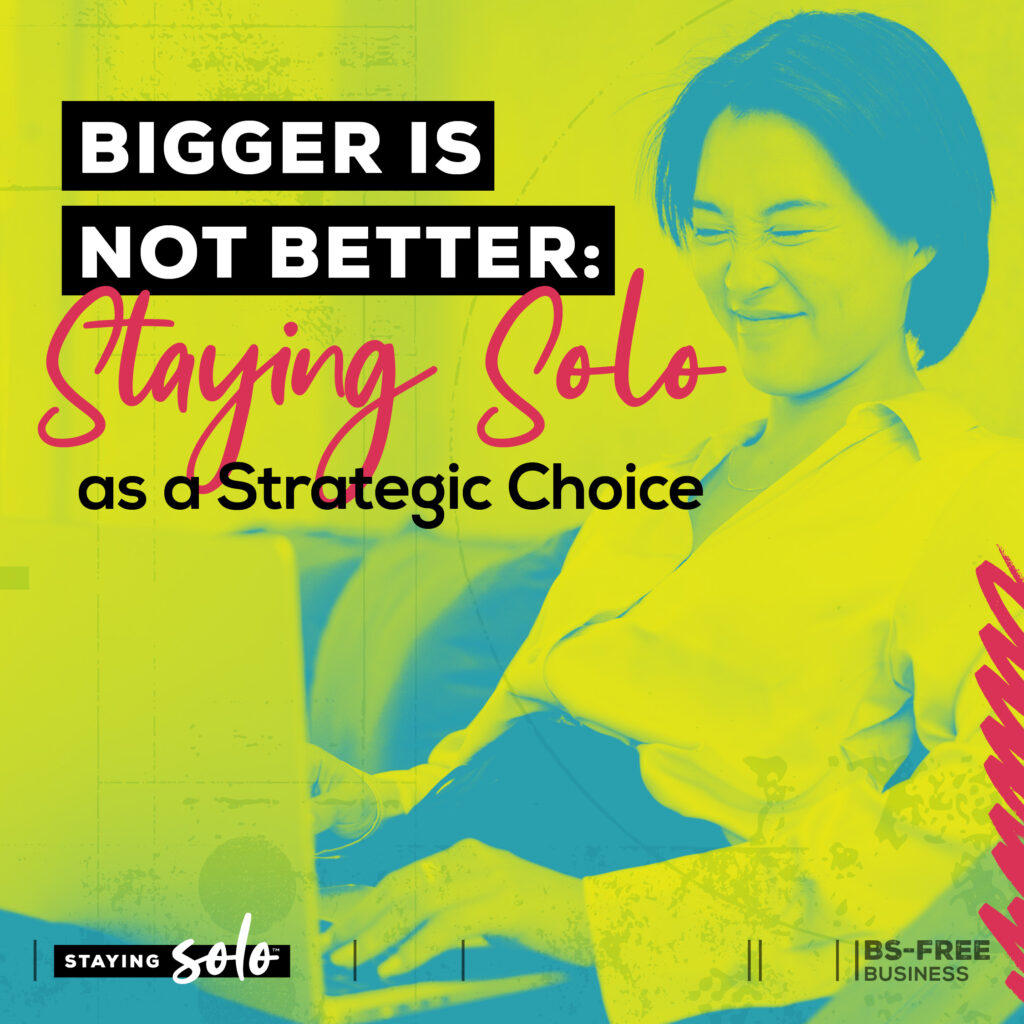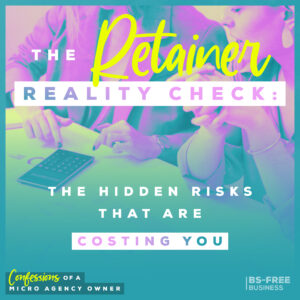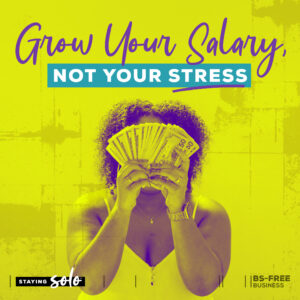
Search the site:
Bigger is Not Better: Staying Solo as a Strategic Choice
The idea that “bigger is better” is one of the biggest myths in business, but what if I told you that chasing growth could actually do more harm than good?
In this episode, we’re unpacking why the pressure to scale often backfires and leaves service business owners stressed, overworked, and disillusioned. If you’ve ever felt that nagging push to expand just because everyone else is, this episode is your permission slip to rethink everything and stay solo instead.
We’ve all heard the saying ‘bigger is better,’ especially in business. But today, I’m here to tell you why staying solo is your smartest move.
For too long, I’ve worked with solo service business owners who felt pressure to “scale” their business by hiring or that they “should” want to build an agency or create a course/program. But the reality is that that’s NOT what they wanted to do; they didn’t want to settle for the status quo of their service business.
This friction is why I created the Staying Solo Framework. Because many of you want to make more money and run your business differently than you are today, but you’re unsure how to do that.
Celebrity entrepreneurs have long sold the dream of scale as the only way to build a business. There’s a steady stream of offers designed to make you feel inadequate as a service business owner, so you buy their things.
I’m talking about things like:
- Scale your business to 7-figures fast.
- Book 10 appointments this month for your consulting business.
- Double your client roster in the next 30 days.
What these claims have in common is the idea that bigger is better for your business.
Today I’m calling bullshit on the entire line of thinking that bigger is better and breaking down exactly why staying solo is the best choice for many service business owners.
How Bigger Can Break You and Your Business
In entrepreneurship, there’s a pervasive myth that bigger is always better. We’re constantly bombarded with stories about scaling at breakneck speeds, entrepreneurs boasting about their ever-growing teams, and making bank.
We see the success stories, but we don’t see the failures. Survivorship bias is a cognitive shortcut in which we mistake the successful subgroup for the entire group, as the failure subgroup is invisible.
For every business that hits the 7—or 8-figure mark, thousands more don’t come close. Success isn’t nearly as inevitable as celebrity entrepreneurs would have us believe, and chasing growth at all costs can be a recipe for disaster.
The hard truth is that bigger isn’t always better. Sometimes it’s just bigger, which means more drama and headaches.
The Hidden Costs of Scaling Up
Scaling a business isn’t just about increasing revenue; it often involves a significant increase in complexity.
The challenges multiply as you add more clients, hire more contractors or employees, and expand your operations. Suddenly, you’re not just managing your work; you’re managing people, processes, and often a lot of chaos. This complexity can lead to inefficiencies, communication breakdowns, and a loss of the personal touch that made your business unique in the first place.
The Stress of Constant Growth
The pressure to grow can be overwhelming. As a business owner, you might feel like you’re constantly chasing the next milestone: more clients, more revenue, more everything.
This relentless pursuit can significantly affect your mental and physical health. The stress of managing a growing business can lead to burnout, anxiety, and even depression.
The irony is that the very success you’re striving for can become the source of your greatest struggles.
Financial Pitfalls
Growth often requires substantial financial investment. Whether expanding your team or investing in new tools, the costs can quickly increase. If the growth doesn’t go as planned, you could be in a precarious financial situation.
Taking on debt or burning through cash reserves to fuel expansion can leave your business vulnerable if things don’t work out.
The Myth of More
At the heart of the “bigger is better” mentality is the myth of more. More clients, more revenue, more prestige—getting caught up in the idea that more is always better is easy.
But more isn’t always sustainable and doesn’t always lead to happiness or fulfillment. In fact, chasing growth for the sake of growth can lead you away from your original goals and values.
Misalignment with Your Values
When conventional online business teachings about growth are discussed, hiring is often cited as the key to freedom, allowing one to offload work while underpaying and exploiting one’s team.
However, this approach compromises core values like fairness and respect, creating a work environment where employees are undervalued and overworked. The focus shifts from building a supportive, values-driven company to maximizing efficiency and profit, often at the expense of the people who help the business succeed.
On the client side, the push for higher profit margins leads to delivering less value at a higher price point. This strategy may boost short-term profits, but it erodes trust and satisfaction, resulting in a revolving door for short-changed clients.
As a result, many businesses that reach multi-six or seven-figure revenues eventually collapse, unable to sustain themselves under the weight of compromised values and unsustainable practices.
The reality is that over the last 18 months, this has been a persistent pattern in the online business world, with the very people who were preaching scale finding themselves unable to sustain what they’ve built.
Defining Your Enough
To stay solo, you need to forget about chasing more, more, more and figuring out what’s enough for you.
Enough isn’t just a number on your bank statement. It’s about having the freedom and flexibility to live life on your terms. It’s about knowing your limits and not pushing yourself to the brink of burnout. It’s about finding that sweet spot where you’re satisfied with your work and your life.
You didn’t start a business for it to eat you alive and suck all the joy out of your life. What’s the point of having a business if you’re too freakin’ stressed and exhausted to enjoy any of it? You might as well get a job and skip all the drama of running a business if you hate it that much.
The goal is to find a happy medium where there’s joy in your business, even if you don’t feel like this is your life’s passion. And a quick reminder, it’s okay for your business and your work to be a means to an end—you don’t have to settle for clients (or services) you hate, but you don’t have to be overly excited about everything.
As a solo business owner, you must intentionally approach your business, making decisions based on your needs, values, and longer-term sustainability rather than external pressures or societal expectations.
When defining enough, the goal is for you to meet your financial needs while prioritizing your desired lifestyle and personal happiness. Knowing what that looks like allows you to set realistic, sustainable goals.
Figuring Out What Enough Looks Like for You
You’re probably wondering how exactly to figure out what enough is for you. Before we get into the “how,” I want to touch on the fact that it will be very personal to you and based on countless factors. It’s important not to fall into the trap of looking for external validation or comparing yourself to your peers.
Now, let’s break down the “how” of figuring out what enough looks like for you.
What’s Your Ideal Lifestyle?
Think back to when you started your business. What was your motivation? I’m willing to bet that while the money was a factor, you wanted a certain type of life. (And I’m not talking about the luxury lifestyle that celeb entrepreneurs want us to aspire to.)
How would you describe that life? Whatever springs to mind is a great starting point for figuring out what enough looks like and the lifestyle that goes with it.
A few questions to consider:
- How much time do you want to spend working?
- What type of work do you want to do?
- What does your schedule look like?
- How much time off do you want to take?
- How much flexibility do you want?
- How are you spending your non-work time?
- What personal commitments are important to you?
- What activities or hobbies are you doing?
Use these questions to determine how your business and life can work together to create a sustainable and fulfilling “enough.”
Assess Your Financial Needs and Goals
Next is the practical part of defining enough: determining your financial needs, including living expenses, savings goals and debt repayments.
Consider what income level would comfortably cover these necessities while allowing for discretionary spending and future investments. Then, set clear financial goals that align with your desired lifestyle. This might include saving for retirement or travel.
I want to remind you that wanting a comfortable life is okay. When looking at these numbers, consider how much you need to live the life you want—not just to pay the bills but to truly live.
By understanding your financial baseline and aspirational goals, you can establish a clear income target representing “enough” for you.
This is why salary is a critical pillar in the Staying Solo Framework. Once you’ve got that number, you can set income goals that align with it. And remember, those goals are for you and you alone.
In the next few episodes, we’ll discuss your salary goal and two other must-haves as you grow as a service business owner: strategy and space. While I’ve talked about these before, three elements of the Staying Solo Framework are advanced strategies for creating a business that gets you to a version of enough that’s sustainable.
Not All Growth is Good Growth
Remember, the ultimate goal is intentionally growing your business so you’re moving past sufficiency to something truly sustainable. In a business sense, sustainability ensures you’re not negatively impacting the world or yourself.
Do you know what’s not sustainable? Wanting to burn down your business or being burnt out! You shouldn’t have to sacrifice your well-being or values to have a business that works for you.
No matter what celebrity entrepreneurs tell us this week, staying solo is a sustainable path to a service business, and bigger isn’t better.
To get support as you grow your solo service business, check out the BS-Free Service Business Mastermind below.


I’m Maggie Patterson (she/her), and services businesses are my business.
I have 20+ years of experience with client services, am a consultant for agency owners, creatives, and consultants, and vocal advocate for humane business practices rooted in empathy, respect, and trust.
Read or Listen to the Latest
Check Out These Posts
For Solo Business Owners

Growing a solo service business is tough.
It’s even harder when you’re bombarded with BS advice that steers you away from your values and why you started your business in the first place.
This is the podcast for solo creatives and consultants who want to remain as a team of one and have zero interest in the hustle and grind of typical business teachings.
Subscribe now and never miss an episode.
For Micro Agency Owners
Most podcasts for agency owners obsess over revenue growth as the ultimate success metric.

But here’s the truth: not everyone wants to make millions. Your goal might be to build a sustainable business that lets you have a life and doesn’t run you into the ground.
Join me as I spill my shameless confessions and share everything I’ve learned about building a micro agency that skips the BS of tired and typical agency teachings.
Follow Now on All Major Podcast Platforms








